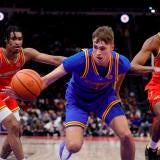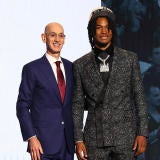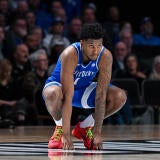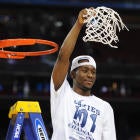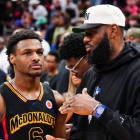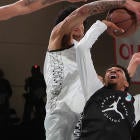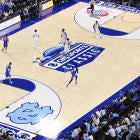
Kansas has imposed a four-game suspension for coach Bill Self and lead assistant Kurtis Townsend to begin the season in response to the NCAA's ongoing investigation into potential wrongdoing by its top two coaches, the school announced Wednesday. The investigation into Kansas, which has yet to conclude as one of a handful of ongoing cases being adjudicated through the IARP process, began in 2017.
Both Self and Townsend were held off the road by Kansas during the June and July live recruiting period as the NCAA's probe into the program dragged on, a source told CBS Sports' Matt Norlander over the summer. That signaled perhaps the first self-imposed sanction from the school as part of a collaborative effort with the NCAA to finalize the investigation, though several other KU coaches were still on the road recruiting in that same span.
The suspensions are just a sliver of some of the self-imposed sanctions the school announced as its case inches closer to a resolution. In addition to holding Self and Townsend off the road earlier this year, they have also included the following:
- The reduction of four official visits during this academic year and in 2023-24.
- The reduction of three total scholarships in Men's Basketball; to be distributed over the next three years.
- The implementation of a six-week ban on recruiting communications, a six-week ban on unofficial visits and a thirteen-day reduction in the number of permissible recruiting days during the 2022-23 calendar year.
- No official visits for 2022 Late Night in the Phog.
The NCAA's investigation into Kansas began in 2017 after the FBI investigation into bribery and corruption within college basketball ensnared the Jayhawks. KU received its Notice of Allegations from the NCAA in September 2019 that included multiple Level I violations -- the harshest in the NCAA rulebook -- which were tied to recruiting improprieties, a lack of institutional control and a head coach responsibility charge levied against Self.
"We are hopeful these difficult self-imposed sanctions will assist in bringing the case to a conclusion," Kansas athletic director Travis Goff said in a statement. "Until then, we will continue to focus on supporting our outstanding Men's Basketball student-athletes and coaches. Assistant Coach Norm Roberts will serve as interim head coach during the first four games. Per confidentiality guidelines related to infraction cases, we are unable to comment in depth until there is full resolution of this matter."
Self and Townsend missing the first four games of the No. 5 Jayhawks' season would hold them out for contests against Nebraska Omaha on Nov. 7, North Dakota State on Nov. 10, No. 7 Duke in the Champions Classic on Nov. 15 and Southern Utah on Nov. 18. Their first game back in action will be Nov. 23 in the Battle 4 Atlantis against NC State.
1. Small admission of *some* guilt?
In the initial federal indictment against Kansas, in which prosecutors presented arguments that an Adidas rep agreed to pay money to the family of a Kansas recruit to induce their commitment, Kansas went so far as not only to deny wrongdoing but suggest that it was the victim in the case.
"Earlier today, we learned that the University of Kansas is named as a victim in a federal indictment," KU said in a 2018 statement. "The indictment does not suggest any wrongdoing by the university, its coaches or its staff. We will cooperate fully with investigators in this matter. Because this is an active investigation, it is not appropriate for us to comment further at this time."
If Kansas really was the victim -- a silly argument to begin with given that it undoubtedly benefitted athletically from such an alleged arrangement -- then it's hard to imagine KU would capitulate and self-impose any type of punishment at all if it felt its case was strong enough to win. It's not a technical admission of some wrongdoing, of course, but it seems to be a negotiated halfway point that might appease the IARP and potentially allow the school, Self and Townsend to sidestep more severe punishment.
Which leads us to ...
2. Aiming to avoid postseason ban
Oklahoma State had a rogue assistant who was caught up in the FBI scandal and pled guilty to accepting around $20,000 in bribery money to exert his influence over student-athletes in steering them to certain financial advisors. OSU fired the assistant, Lamont Evans, upon hearing this news. But the damage done -- on top of Evans' refusal to cooperate with NCAA investigators after his firing, which was apparently an aggravating factor in OSU's case -- led the NCAA to levy a postseason ban against the program on top of stiff recruiting penalties and loss of scholarships. Kansas, though, despite facing five (5!) Level I violations, appears on track to avoid such a fate.
KU's case is being adjudicated through the IARP, the special committee formed solely for complex cases in the wake of the FBI scandal. OSU's was not. But the belief in the industry is that Kansas' self-imposed sanctions, like holding Self and Townsend off the road as well as the additional ones announced Wednesday, may allow them to avoid a postseason ban. If that does indeed come true -- the IARP punishment timeline remains unclear -- it would allow the reigning national champions the opportunity to defend their title in 2022-23.
3. Bruce Weber can finally get his ears lowered
It's possible that both the most underdiscussed and most hilarious storyline of the 2021-22 season was Kansas State coach Bruce Weber's outright public refusal to cut his hair until schools facing heat from the FBI scandal, including and especially cross-state rival, Kansas, was punished for its improprieties in the NCAA case.
Weber was fired after the season concluded, so the storyline died out a bit. But in March, as his hair quickly got out of control, he took a stand by boasting about running a clean program while taking a little jab at others who (allegedly) did not. That included a not-so-veiled stab at KU, which at the time was tracking towards a 1 seed on its road to eventually winning the NCAA Tournament.
"We did it the right way," said Weber. "We did it with our guys graduating. I'm on the NCAA ethics committee. And on the meetings, I was told that they were going to take care of the people in the FBI stuff. So I told somebody, 'I'm going to grow my hair until something happens.' Obviously, it's still growing. That's the sad part of our business. Lon Kruger told me the other day, think about all the guys in the FBI thing. They are all in the NCAA Tournament except one. So I'm just proud of what I've done."






